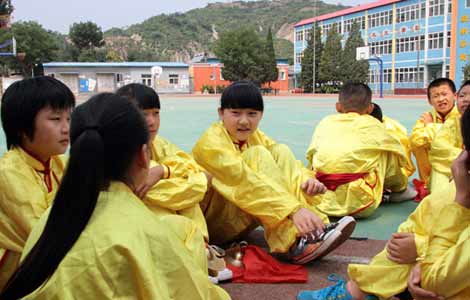Lost for words
Updated: 2013-08-31 02:56
By Raymond Zhou (China Daily)
|
||||||||
Now there are generally two ways to input Chinese characters on a standard keyboard: one is a system that turns each character into a sequence of usually four numerals, a system for which one has to memorize a set of rules and use regularly to be fast; and the other is pinyin, a form of Romanization that enables you to read out each character. If you know how a character is pronounced in Putonghua, the pinyin input is intuitive even though it requires another step of selecting the right character from a lineup of homonyms. According to one survey, 90 percent of all users depend on this method.
An emerging exception is the use of touch screen for handwriting each character, prompting several look-alike characters to appear from which you can then select the right one. People who don't speak correct Putonghua or have never learned pinyin, mostly those of an older generation, have found this useful.
Three decades of widespread use of personal computers and gadgets have effected a dichotomy between the skill of recognizing characters and that of handwriting them. Selecting the right homonym out of say two dozen choices is easier than writing the correct strokes.
In my line of work, handwriting still comes in handy. When I interview people, I use a notebook instead of a computer and often use pinyin for words whose strokes elude me. These are just pointers to remind me of words when I return to my notes later.
On the rare occasion I have to leave a handwritten note for someone I sometimes resort to my cellphone for a pinyin-enabled display of the characters — not esoteric ones, mind you — to avoid looking unprofessional with pinyin spliced into a sentence of Chinese characters.
In other words, if I was a contestant on that show, I may well flop at the first character test. And I was trained in this skill before anybody in China had seen a computer keyboard.
Is it terrifying that this fundamental skill of being culturally Chinese is eroding at an alarming rate and scope? Yes and no. While the ability to handwrite a Chinese vocabulary of certain size is to be admired, we have to ask ourselves if it is really as essential to a basic education as we assume.
To answer that question, we have to understand the functions of a language. For most people, a language is solely for communication. If you can talk in Chinese and write simple sentences — nowadays increasingly in text messages — that's probably enough. For a select few, however, language is more than a tool of communication; it is a form of art through which one can express exquisite emotions, artistic aspirations and philosophical thoughts. Even for this group there are multiple layers of sophistication. One may lament the loss of handwriting, another will go one step further and say that not only are the strokes of characters essential but traditional brush calligraphy should be part of a Chinese person's education.
The irony is, the higher you raise the bar, the lower the rate of literacy will be. Say, if we define literacy as five different styles of calligraphy with a vocabulary of 10,000 characters, the rate will be abysmally low. That is the rationale behind the initiatives since the May 4th Movement to push for the simplification of Chinese characters as well as Romanization efforts such as pinyin. When we compare a set of traditional Chinese characters, used in Hong Kong and Taiwan, with the simplified ones, of course the older style is more elegant and richer in connotation, but it is so much harder to learn well that fewer people will be able to use the language, at least in writing.
I still remember the shock I had when meeting old people in rural areas who could not write their own names. For them, an education is tantamount to the ability to read a small number of characters. I doubt today's young will suffer the burden of this kind of illiteracy. With the ubiquitous gadget, it is almost impossible to be denied the basic skill of reading and writing, ahem inputting.
But for kids who aspire for more, the option of mastering the refined parts of the language, just like learning the classics or playing the piano, should always be available and encouraged.
|
 |
 |

 'Despicable' minions upset Depp's 'Lone Ranger' at box office
'Despicable' minions upset Depp's 'Lone Ranger' at box office
 'Taken 2' grabs movie box office crown
'Taken 2' grabs movie box office crown
 Rihanna's 'Diamonds' tops UK pop chart
Rihanna's 'Diamonds' tops UK pop chart
 Fans get look at vintage Rolling Stones
Fans get look at vintage Rolling Stones
 Celebrities attend Power of Women event
Celebrities attend Power of Women event
 Ang Lee breaks 'every rule' to make unlikely new Life of Pi film
Ang Lee breaks 'every rule' to make unlikely new Life of Pi film
 Rihanna almost thrown out of nightclub
Rihanna almost thrown out of nightclub
 'Dark Knight' wins weekend box office
'Dark Knight' wins weekend box office
Most Viewed
Editor's Picks

|

|

|

|

|

|
Today's Top News
US says 1,429 killed in Aug. 21 chemical attack
US boosts troops in Philippines amid tension
Xi urges military to expand training
IMF warns on capital account
Error costs Everbright millions
Economic slowdown, railways hold back airlines
Sinopec takes stake in Egyptian oil
Japanese politicians visit to fix relations
US Weekly

|

|







